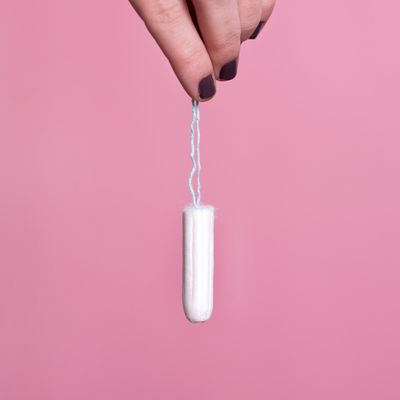
Model Lauren Wasser’s story is the worst nightmare of anyone with a vagina — in 2015, she woke up in a hospital to discover she was scheduled for a leg amputation after her tampon caused toxic shock syndrome. This week, Wasser’s experience put her back in the news when the Washington Post reported that she may soon have to undergo an amputation of her other leg, too. It’s enough to make you want to swear off tampons forever.
Toxic shock syndrome, or TSS, is a severe complication of certain bacterial infections; it’s often associated with tampons because the blood that accumulates in a tampon can serve as a culture medium for the bacteria. But before you clear your drawers of every last Tampax, there’s something you should understand about TSS: It’s incredibly rare, affecting less than one out of every 100,000 people in the U.S. And if you use your tampons properly, your risk of developing TSS is no higher than that of a man who’s never had a period or used a tampon to staunch anything other than a bad nosebleed.
But anyone who’s ever fallen down a WebMD rabbit hole and ended up diagnosing themselves with some rare disease knows that statistics aren’t necessarily soothing. So to put your mind at ease, here are the signs of TSS: The earliest warning signs of the condition are flulike symptoms — vomiting, high fever, diarrhea, and muscle weakness — paired with a flat, red, sunburnlike rash that can appear on the palms of the hands or soles of the feet. If you have one or two flulike symptoms and you happen to have your period, there’s no reason to panic, explains Gillian Dean, senior director of medical services at Planned Parenthood Federation of America. It’s the rash that’s key.
“If you’ve got a tampon in and you’re vomiting, there’s no reason to think that’s TSS,” she says. “Most of the time when people are sick during their period, it’s either because of their period, or it’s the cold they caught from their neighbor. But if you’re using a tampon and feeling very ill and you notice that rash, you need to be seen in an ER or by a clinician immediately.”
Another piece of info to soothe your anxious mind: Doctors have gotten very good at diagnosing and treating TSS; full recovery is not only possible, but probable. That’s not to say that TSS isn’t a serious, life-threatening condition, as Wasser’s experience of limb loss illustrates. “You can have multisystem organ failure and decreased circulation to your extremities, which can cause cyanosis or limb death, and necessitate amputation. In some cases it can be really, really serious.” Dean says. But “the most common outcome is full recovery.”
TSS isn’t just a consequence of tampons, either — about half the cases of TSS that do occur every year have nothing to do with periods. More than half of the people in the U.S. are “intermittent carriers” of the specific strain of staph bacteria (Staphylococcus aureus) that causes TSS, and around 20 percent have it on their bodies full-time.
“The staph bacteria can cause an infection when it gets into parts of the body where it’s not normally found and multiplies,” Dean says.
“Some strains can release a toxin, and that’s what causes TSS. It can occur after surgery, as a result of healing skin wounds, or even in someone who’s breastfeeding.”
The simplest way to avoid TSS is not to stop using tampons, but simply to use them correctly: Avoid super-high-absorbency tampons if possible, and use the lowest absorbency that meets your needs. Make sure you change your tampon every four to eight hours at a minimum, and try to give your body a break. (The same goes for any item that remains in the vagina for a significant period of time, so menstrual cups aren’t exempt.)
“Especially on lighter days, I recommend using a pad at night instead of a tampon, so you’re not constantly inserting one after another for your entire period,” Dean says. “But I don’t think women should be afraid to use tampons, especially if it’s their preferred method of dealing with their period.”
“For many women, feeling free from worrying about their menses increases their quality of life,” she adds. “Tampons have a really important place in women’s health and well-being.”




